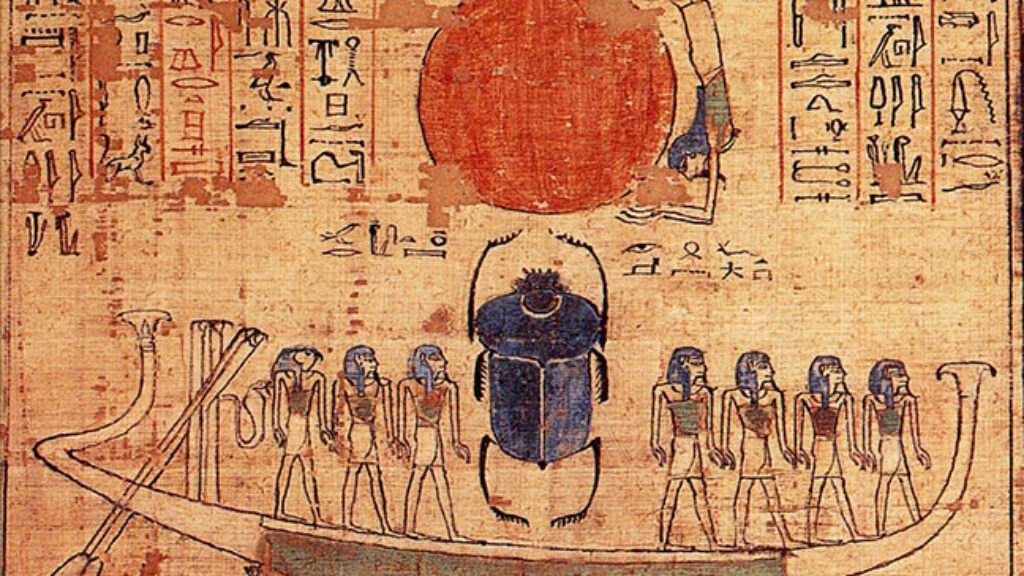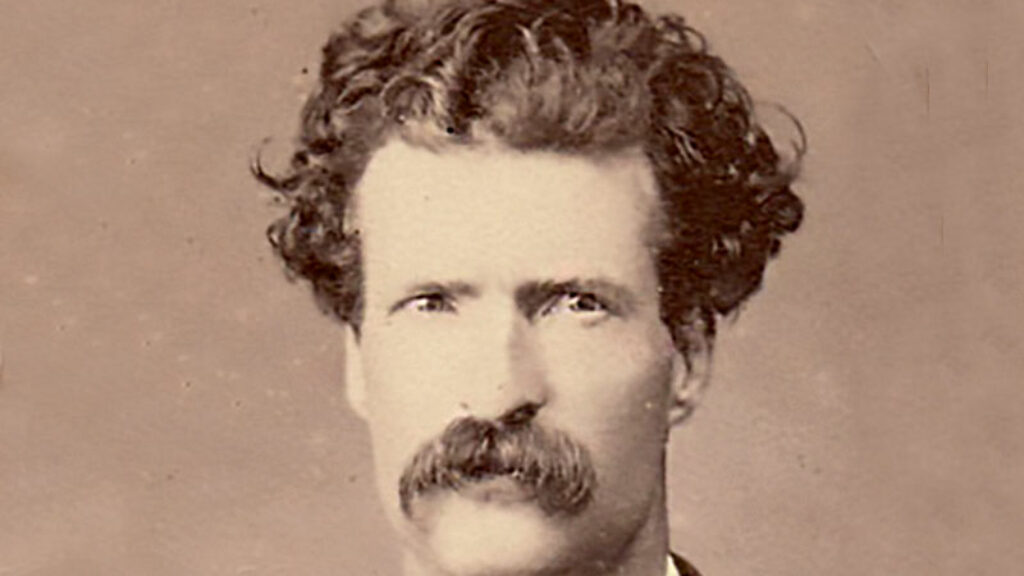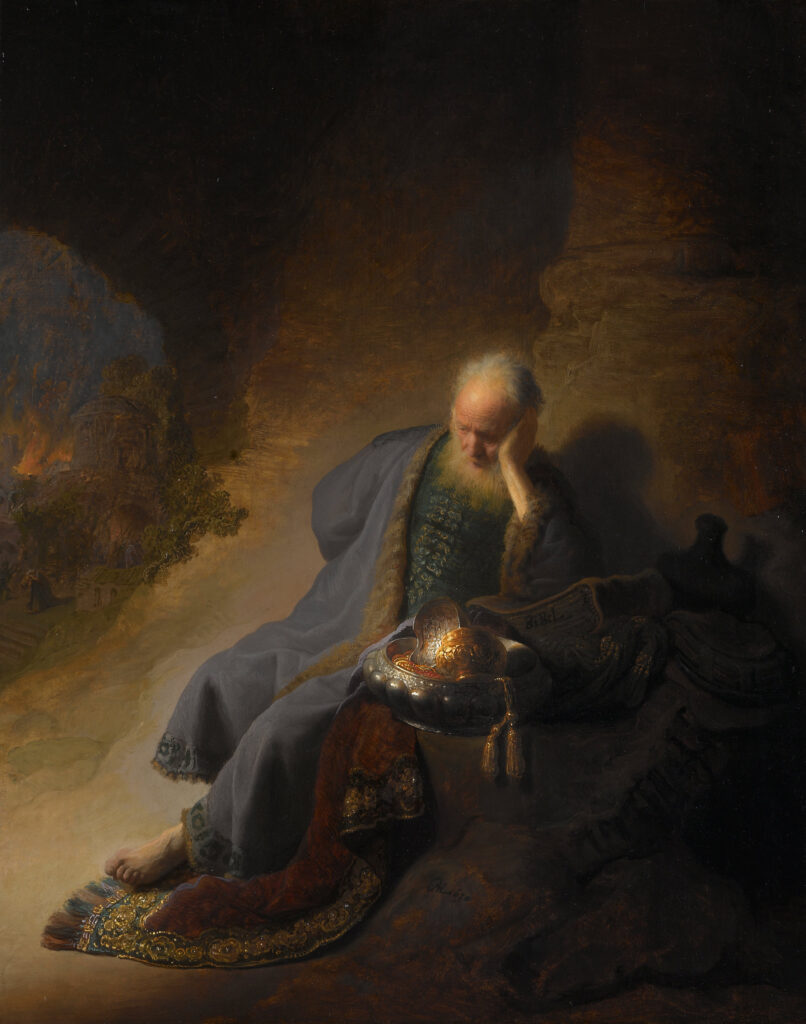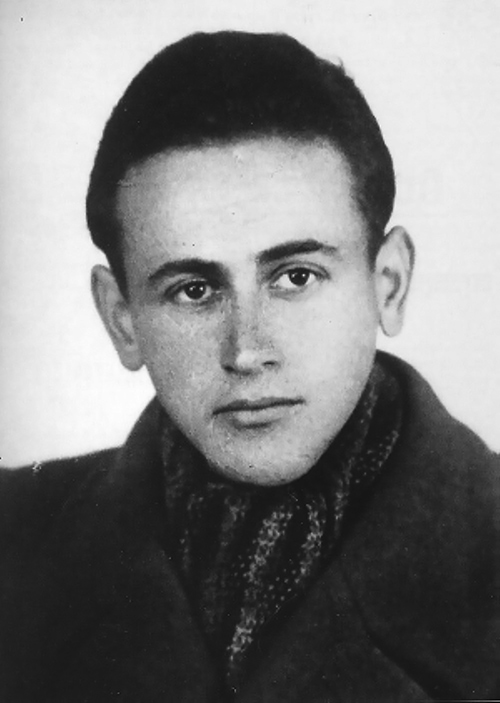After Silence: On Lamentation
Eicha, the lament for the Temple of Solomon ascribed to the prophet Jeremiah, is in part a book against language. Its eponymous opening (often translated “alas!”) is as much a cry as a word. In the first two chapters the enemies of the Israelites taunt and jeer. The Israelite children ask their parents for food but the Israelite parents themselves manage only to sigh. The elders are sitting on the ground and not speaking. God was apparently doing likewise. According to a midrash, the Lord saw the destruction in Jerusalem and asked the angels what a king in mourning ought to do. They told Him to be quiet.
The Jewish tradition had responded to horror with speechlessness before. In Leviticus 10, God killed Aaron’s two sons for an illicit sacrifice and, in response, vayidom Aharon: Aaron was silent. But equally, as Eicha demonstrates better than any other Biblical text, the tradition has responded to horror with speech, even poetic speech, even poetic speech the speaker suspects is futile—“With what will I testify about you? To what can I compare you? says the narrator of Eicha to the bereaved city of Jerusalem.
Poems are an odd way to express horror and especially moral horror. The destruction in Eicha is gruesome; Eicha itself is beautiful. This obscene mismatch, of the sense of a poem with the sound of poetry, famously prompted the philosopher Theodore Adorno to declare that “to write poetry after Auschwitz is barbaric.” Whatever a Jeremiah would have said (or written), the death camps had disqualified human beings from using language in that way.
More recent horrors have caused Jews trouble with prosaic speech, to say nothing of verse. Shortly after the October 7 Nova music festival massacre—364 murdered, forty kidnapped—one of the organizers gave an interview: “this cruelty, the stomping of dead bodies, the killshots, the abusing of women, the disrobing of their bodies . . . to abuse the bodies of dead girls? Children? . . . it’s incomprehensible.” It isn’t grasped, is what his Hebrew literally means. Dozens of writers—and, I suspect, thousands of people in private conversations—echoed such speechlessness on the grounds that the massacres were simply beyond the utmost bounds of human thought.
Going silent was a theme of post-Holocaust Jewish thought, and Adorno was not the only writer after the Shoah who thought language was no match for the horrors. George Steiner’s Language and Silence meditated on the “fact that language does have its frontiers, that it borders on three other modes of statement—light, music, and silence.” The third is proper to “the world of Auschwitz [which] lies outside speech as it lies outside reason.” Arthur Cohen begins his theological reflection on the Holocaust, The Tremendum, by conceding the uselessness of any reflection. “Thinking and the death camps are incommensurable,” because thinking involves the hope, which the Holocaust defies, that the object of thought might be “master[ed].”
The whole event resists language––this is different from a survivor saying he cannot convey what happened to him. Jean Amery, who was tortured by the Gestapo and lived through Auschwitz, laments in At the Mind’s Limits that qualities of what we feel internally mark “the limit of the capacity of language to communicate. If someone wanted to impart his physical pain, he would be forced to inflict it and thereby become a torturer himself.” Amery writes that the camps put the intellectual, the thinker and wordsmith by vocation, in a vice. The thoughts of inmates were concentrated on just staying alive.
But what about when language is not constrained by the need to survive, and is free to illuminate and to mourn? What about when, like Jeremiah, we have some time to sit and write? The risks of writing badly give reason to not write. Carelessness and cliché are bad enough when they aren’t distorting crimes that were deliberately, even meticulously, perpetrated and acutely suffered. But as a final response to depravity, silence has costs of its own––it puts a central fact of our conscious lives beyond the reach of the only tool we have to inquire into what it means to live consciously at all.
Why has the Holocaust been so often wondered about? It wasn’t just the huge number of dead, which had precedents in plagues, famines, and World War I. What was new was the artifice, especially the small, manmade planets of the death camps. There had been factories and bureaucracies, but not for that, and certainly not for that much of that. Cohen sees the mystery of the Holocaust in its immensity––“it exceeds the discernible causalities of history to which its apparent configuration occurs.”
But such excess is a feature of everything men do. All the facts about Germany, from Luther until Weimar, underdetermined what the Nazis did because the Nazis were self-determining. Racial antisemitism, Christian anti-Judaism, humiliation, inflation, charismatic leadership, and nihilism all had something to do the deaths of six million Jews. And, all of them together killed not even one Jew. What always makes the difference between the conditions of mass-murder and actual mass murder are awful, free choices. The same is true of events that are tremendously good or mundanely cruel.
Unlike luck and chance in nature, actions are intentional. They are done for reasons, to achieve some goal through some means. Good and evil differ in the moral quality of reasons, not in the role reasons play in what we do. Of course, the Holocaust’s intendedness is one of the best-established facts in history, even if the exact final fantasy of Nazism is a matter of contention. But given the technical skill and the absence of resistance, the directedness of the Shoah’s machinery explains––in a way that is very difficult notto discern and that requires no particular skill to articulate––the immensity of the result.
Nor is silence morally neutral. If the excesses of the Holocaust were not explicable in terms of man’s reason, then the camps would have had instruments and victims, but no perpetrators. No one would have been wronged, because no one would have acted wrongly. The reasons for the Shoah are just what permits us not to excuse it as the work of an inscrutable force.
Historians have successfully answered Cohen’s challenge, but there are deeper grounds for silence (history isn’t the only possible task for language). Steiner’s worries were moral and aesthetic––he suggested that attending to the “bestiality” of the Holocaust debased the poet’s language and hence the poet’s humanity. The “new darkness” of the concentration camps did not deserve words. “Silence is an alternative,” Steiner wrote, and “When the words in the city are full of savagery and lies, nothing speaks louder than the unwritten poem.”
Except for the poem (or the prose) that makes an attempt at restoring the truth. The attempt is miraculous when (Steiner is surely correct to say) the event was itself so inhospitable to language––because people who are tortured and starving and freezing can barely think, and because the Germans imposed a regime of euphemism upon the camps that made meaningful speech into a form of resistance.
Steiner claimed that neither fiction nor historical analysis had “been empowered to communicate the substance of the inhuman.” But he thought that one poet, Paul Celan, had managed it. Celan wrote:
There was earth inside them, and
they dug.
They dug and dug, thus did
their day go, their night. And they did not praise God,
who, so they heard, wanted all this,
who, so they heard, knew all this.
They dug and heard nothing more;
they didn’t grow wise, invented no song,
thought up no language for themselves.
They dug.
The poem’s repetitious digging prevents any novelty in music or in language. God knows and does not interfere––there is no religious solace from the absence of creativity. Celan restores the speech the Nazis beat out of their prisoners by saying what being forced into silence is like. His phrases hit with low and steady beats.
Celan once said, in a short speech to a literary society, that although during the Holocaust language “had to pass through its own answerlessness, pass through frightful muting,” it could “come to light again, ‘enriched’ by all this.’” The ironic quotation marks around “enriched” indicate the barren quality of camp life that language had to assimilate in order to faithfully describe. Primo Levi’s memoir of survival in Auschwitz exhibits the same parsimony:
When this music plays, we know that our comrades, outside in the fog, are marching like automatons; their souls are dead and the music drives them, as the wind drives the dead leaves, and takes the place of their will . . . [the] prisoners are ten thousand, and are a single gray machine; they are precisely determined; they do not think and they do not desire, they walk.
Levi’s prose is as impoverished as camp life itself—numbing rather than affecting. Like Celan, and unlike Jeremiah, he seems to write from within the horror not after it. These writers tell us what it was like to be victims, and we, after all, would have been among them.
If there is a part of the Shoah that it would simply be obscene to subject to literary investigation—something about which silence is humane—perhaps it is the people responsible. But there were survivors who humanized the perpetrators. József Debreczeni, a Hungarian Jew who, like Levi, survived Auschwitz, offers in his literary memoir Cold Crematorium one of the most arresting descriptions of a villain I have ever read.
Half Arm is the chief supervisor of a network of camps, so named because an injury put his arm in a sling. When Half Arm comes to a work site, “a cigarette was smoldering between straight, slender lips. Thin gold-framed spectacles atop a finely cut nose.” Half Arm calls for the kapo and inquires, sounding “almost friendly,” how the work is going. The kapo says it is going well. Nice! exclaims Half Arm, who is your best worker? The kapo gives the inmate number of a young Carpathian Jew, a ruddy ex-logger and who does not look Jewish. The young man presents himself and Half Arm “reaches lazily for his holster, pulls out the revolver, and presses the barrel” to the temple of the man, and shoots him, and “smiles silently, absentmindedly,” announcing “an example of how even the best Jew must croak.”
In peacetime, Half Arm might have been a dandy. But in the war against the Jews, he’s achieved the rank of captain. In this episode he is not an intense sadist, lopping off limbs with a sword like Treblinka’s Ivan the Terrible. He is a bored prince of infinite space. He initiates a childish game, a piece of bad drama. But it climaxes in the killing a human being, and it may do the same tomorrow.
I have met, we’ve all met, refined people with pretensions and without cores, who want to be important and are not. Perhaps one of them could be induced––under the right conditions, given the right assurances, paid the right amount—to inform on people, to oppress them, to preside over their enslavement, maybe even execute them. Debreczeni’s depiction is persuasive decause it depicts the palpably perverted humanity of the perpetrator. Kitschy Half Arm, too, is a part of our condition.
One of the questions I had after October 7 was what Hamas gained by advertising it online. The Nazis were far more discrete, hiding their death camps in Polish forests. After an inmate rebellion, Treblinka was demolished and planted over (imperfectly: Vasily Grossman found bones and teeth in the ground when he arrived with the Red Army, and wrote that “the earth does not want to keep secrets”). But Hamas’s real-time broadcasts may have broken new ground.
They reminded me of Thomas Harris’s 1981 novel Red Dragon, about detective Will Graham seeking a murderer who breaks into homes, smashes the mirrors, and kills whole families. Graham is inspecting the site of the Leeds family’s killing. The culprit is Francis Dolarhyde, and as Graham learns more about him, his appellations get more personal—from “madness” to “the crazy” and “madman” to “my man.” The husband and children are killed, and then they’re lined up with shards of mirror inserted in their eyes: “They were watching a performance starring the madman and the body of Mrs. Leeds, beside Mr. Leeds in the bed. An audience. The crazy could look around at their faces.” Dolarhyde’s nighttime orgies of violence convert his shame into triumph, witnessed and reflected by his victims’ post-mortem.
Dolarhyde is killed before he can release the recordings of his slaughters—“his life’s work, a magnificent thing. It would live forever”—to the public. Hamas did not delay. The videos of terrorists whooping, their victims collapsing, the displays of bloodied corpses and screaming hostages, are the same attempt to break people by forcing them to watch their defeat. For years, Hamas’s war against Israel had failed and everyone knew. For a day, Hamas exulted in the inversion of this dishonor, with an audience of worldwide Jewry completing the fantasy.
I understand why Steiner and others called the Nazis beasts, and I understand why Jews have said the same of Hamas countless times since October 7. Exclusion from the species is the ultimate form of moral contempt—and in, the case of Nazis, reverses the claim that Jews were sub-human. But the talk of beastliness gets things wrong. Animals can’t be wicked. Only beings with souls and wills can be wicked. Only beings like us can be wicked. Every moral horror involves an extreme form of a vice—pride, cruelty, resentment, envy—we see and exhibit ourselves every day. Moral horrors involve other things too, some of them foreign to basically decent people. But part of what forms the root of the alien desire to kill is the very familiar desire for revenge. We’ve all felt shame, prejudice, a lust for power. If we hadn’t, encountering fictional villains like Dolarhyde—who don’t overwhelm us with rage as real-world murderers do––wouldn’t be so uncomfortable.
Declaring the worst evils indescribable is a form of self-protection. It denies that people guilty of petty wrongdoing could ever be guilty of extraordinary wickedness. We couldn’t even talk about such about such things, much less do them ourselves. But we could. Of course we could, and so could anyone. We choose not to. Calling evil bestial and their crimes ineffable, literally unspeakable, amounts to saying that we are bound to do only good things, or at worst venial things, a denial of our moral freedom. It is essentially self-deceptive.
Animals are beneath us and evil ought to be, and people often talk about the latter in terms of the former. But the post-Holocaust literature also made the opposite argument for silence in the face of evil—evil is somehow above us. “It is just because we can go no further,” Steiner says, “because speech so marvelously fails us, that we experience the certitude of a divine meaning surpassing and enfolding ours. What lies beyond man’s word is eloquent of God.” The title of Cohen’s book, The Tremendum, refers to the German theologian Rudolf Otto’s name for man’s mysterious encounter with God. The Holocaust, Cohen writes, has its own version of the effect:
However much we may be fascinated and in awe of divine power, we are not less fascinated and in awe of monstrous power, that is, the power and works of the monstrous.
Steiner and Cohen are getting at something that must be felt by anyone who visits the camps, or the devastated kibbutzim on the Gaza border. They are sublime in the negative. They induce a terrible wonder, they make you think about nothing else (everything else feels so small), they make you fear and tremble. The camps are, in a word, silencing.
But, it seems to me, this same silence is idolatrous, giving to evil what should be given only to God. Maimonides is the Jewish philosopher who most famously said that God was absolutely out of the bounds of speech. Human beings know only their fellow creatures and the things of their world, so human language is inadequate to the Creator of that world. Maimonides takes God’s indescribability about as far as it can be taken, because the God of Maimonides shares absolutely no traits with His creatures. Even Maimonides’s less radical medieval peers agreed that speech about God can be true only provisionally, metaphorically, or analogously, and never simply. It may be the aspect of Biblical theology to which the medieval theologians were most committed—that God not simply an undying superhuman within the cosmos, but beyond and responsible for it.
The same silence, the same failure of language, cannot be extended both to what God is and to what men do. The alternative, as Cohen himself senses (but which, so far as I can tell from his difficult text, he never convincingly avoids), is to make evil the “twin of the divine,” an independent, gnostic force different in value though not in power from a just God. Evil just doesn’t deserve this perverted exaltation, as the Bible implicitly warns us very early on. In Genesis 8:21, God laments that the tendencies of man are evil from youth. He doesn’t suggest a limit to the forms that evil might take. He says the capacity is ordinary to us. Experience shows that it does not, like a haunting menace, exceed our powers of resistance. It also does not, like an infinite being, defeat our powers of description. So we describe and lament.
Suggested Reading
Religion, Power, and Politics: An Exchange
Rabbi Riskin's review of Rabbi Sack's latest book ignited a discussion on the role of power in Judaism.
Revealer Revealed
Earlier this year, an email announcement of a publication made its rounds among scholars of Jewish studies. Written in the flowery Hebrew of the Eastern European Jewish Enlightenment, the advertisement proclaimed that the work would “reveal all secrets.”

Exodus and Egyptology
The Koren Tanakh of the Land of Israel shows why the plagues were chosen and how the Israelites sang at the reed sea.

Not So Innocent Abroad
Mark Twain's book about his travels to the Holy Land and back is his bestselling book over the course of his lifetime and remains one of the bestselling travel books of all time.


Comments
You must log in to comment Log In